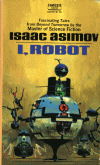I recently started reading the Cobra Trilogy by Timothy Zahn. Cobra, the first book in the series, starts off just after the beginning of the Troft war with the Dominion of Man. At the beginning of the novel, the Trofts have already conquered a two key worlds in the outer systems. The military, in a desperate move, created the Cobra program to train an elite force of enhanced soldiers. One of the first things that came to mind when I came across this series was Starship Troopers, the BOOK, not the movie. I immensely enjoyed the first few chapters of Starship Troopers with the cap troopers in the Mobile Infantry. The main difference is that instead of troopers inside of huge external mech hardware, the Cobras’ enhancements are essentially hidden, yet very deadly. On the outside they look like a normal human, which is one of their advantages.
The main character is Johnny, who wants to join the Army. He wants to out of sincere patriotisim, not just to impress some girl. He tells the recruiter that he wants to get right into the fighting and help the citizens of Adironack and Silvern through guerrilla warfare. Johnny’s father had fought in the previous war against the Minthisti, but aboard a ship in the Star Forces. Johnny ended up getting the assignment he wanted, but with a few unexpected conditions.
After initial selection for the Cobra unit, irreversible surgery to implant the enhancing hardware and software had to take place. Bones were hardened, lasers implanted in his pinkies, servos in his joints, and a combat computer eventually was installed in his head. This, along with other weapons that could be externally equipped, made Johnny one of the most advanced soldiers in the Galaxy.
The first hundred pages or so covered Johnny’s training in the Cobra team and subsequent deployment on Adironack to help the citizen underground resist the Troft occupation forces. The battles were exciting and detailed, which reminded again of Starship Troopers. That is about where the similarities ended. Before I knew it, the war was over and Johnny was back at home trying to readjust to “normal” life. It was only a matter of time before someone tried to screw with Johnny too much and his combat computer kicked in and killed someone.
The book takes a turn towards politics after this. The government had quite a dilemma. They couldn’t remove all of the Cobra hardware without killing the soldiers, and they also couldn’t have soldiers accidentally killing others when they were threatened. Eventually a solution was devised; they would be used to colonize a small group of planets on the other side of Troft space. These were worlds yet to be tamed with plenty of dangerous flora and fauna that the Cobras could be used to protect colonists against.
At this point I kind of felt my interest dissipating. There was some guy jumping through the air with lasers coming out of his hands, kicking some major ass on the cover! I was all psyched up for huge battles and got just a taste of it. The action slowed down considerably during the colonization and picked up briefly during a small uprising. Overall I was a bit disappointed. Having finished the first book, Cobra, and I’ve decided that I like Zahn’s later work more. Hopefully the next book, Cobra Strike, will live up to the title and offer more action than the first in the Trilogy.
Cobra Timeline:
- 2403 – Trainee
- 2407 – Veteran
- 2414 – Loyalist
- 2421 – Politician
- 2432 – Statesman


